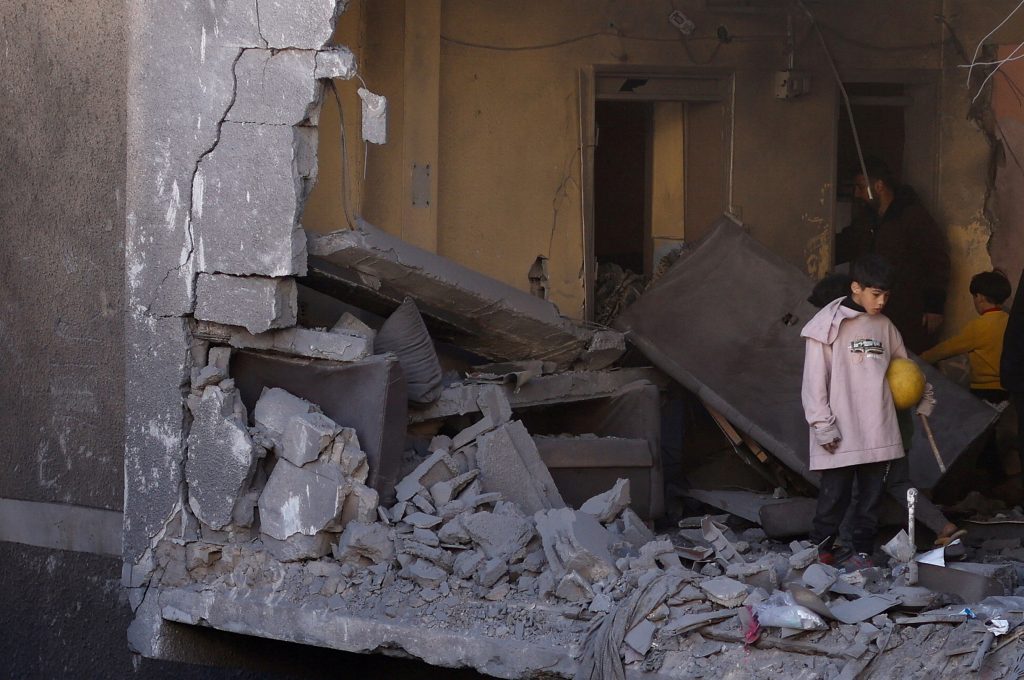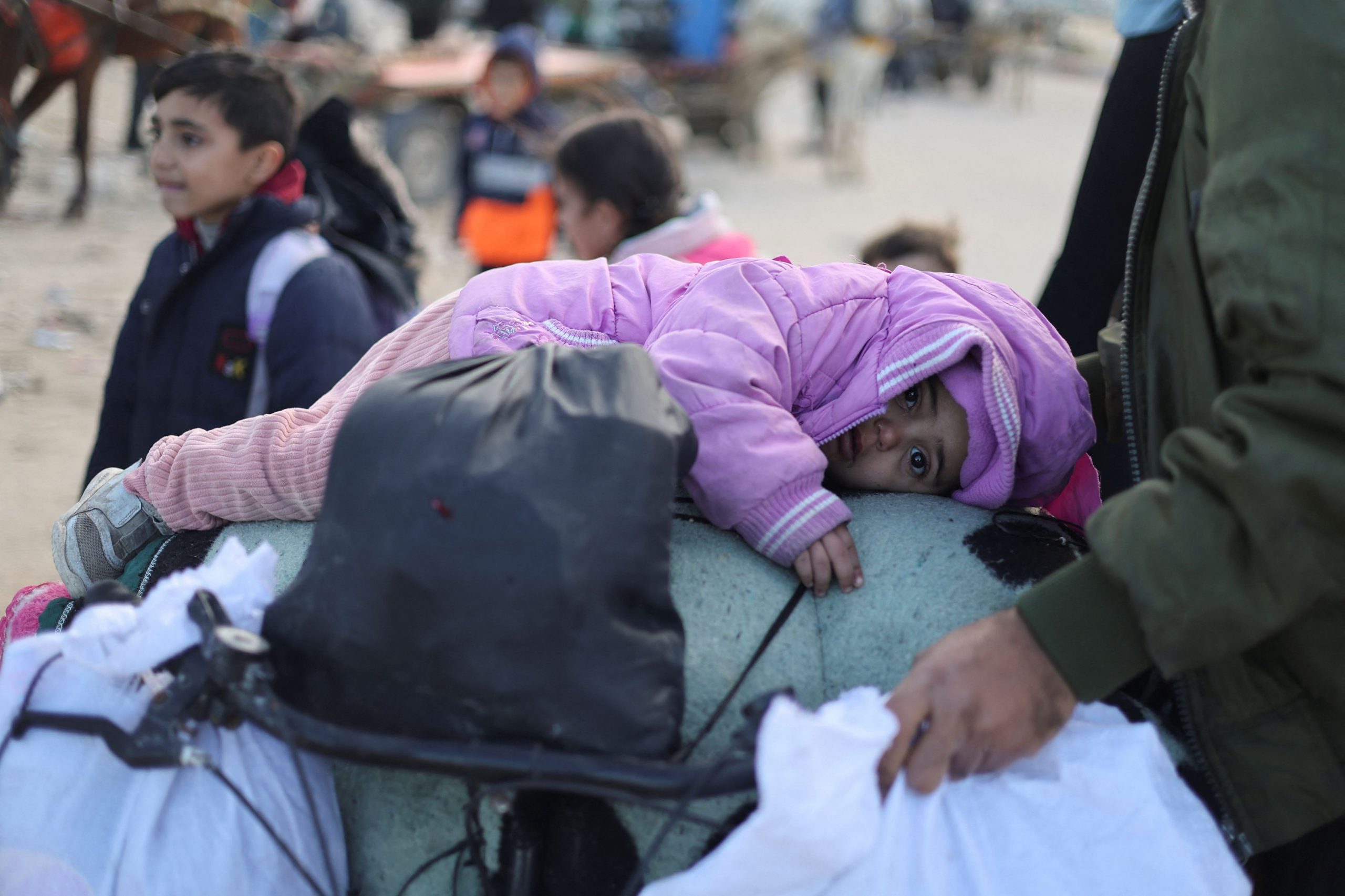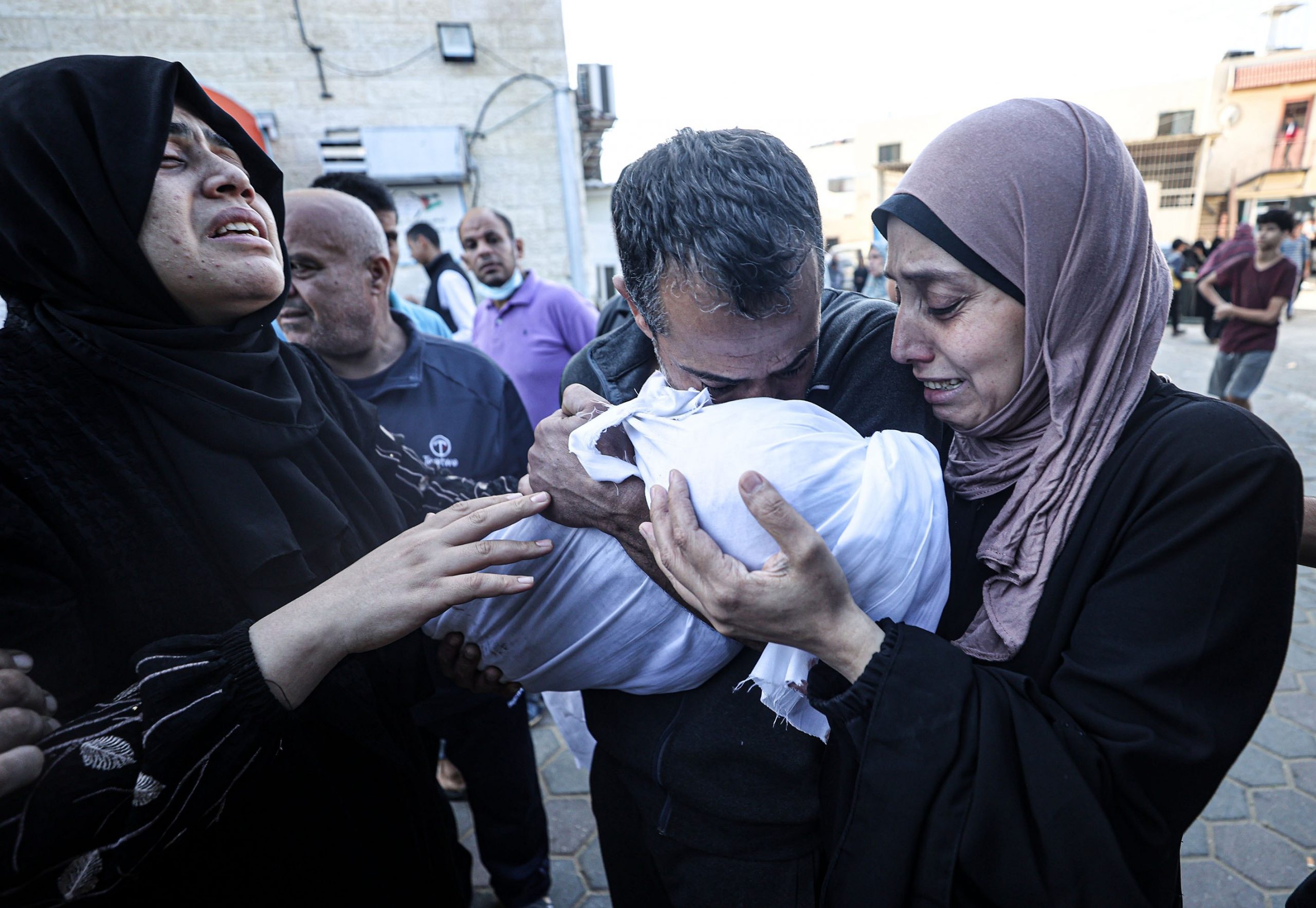Noura Baalousha’s contractions began on a cold December evening, as the heavy thud of shelling reverberated around the building where she was sheltering in northern Gaza. There was no phone signal to call an ambulance and it was too dangerous to venture outside.
“I felt so afraid. I knew I wouldn’t be able to reach the hospital. My water broke and I knew I would deliver at any moment,” recalls Baalousha, whose four other children were born in a hospital. During a previous war in Gaza, she witnessed a doctor deliver a baby in a home.
“I had no other options, I forced myself to remember everything I had seen,” she said. Baalousha’s sister-in-law helped deliver the baby boy, Adam, using wooden laundry tongs to clamp the umbilical cord and kitchen scissors to cut it.
There were more than 50,000 pregnant women in Gaza when the war began on Oct. 7, according to United Nations estimates. Gaza has one of the highest birthrates in the region.
Some 180 women in the enclave give birth each day on average, many now with little or no medical help, sometimes in dirty, overcrowded shelters, public bathrooms or cold, makeshift tents, according to the U.N., healthcare workers and residents.
Giving birth in normal times can be a traumatic experience; going into labor in a war zone multiplies the distress and danger. Gaza’s new mothers and their babies are especially vulnerable to the fallout from the conflict between Israel and Hamas taking place around them, where the battlefield is sewn into civilian areas, from disease and displacement to shortages of food and water.

Expectant mothers who make it to hospitals in Gaza rarely get the level of care they need, according to the U.N. and healthcare workers. With only 13 of the enclave’s 36 hospitals functioning, and those only partially, the facilities are short-staffed and overwhelmed by the number of war-wounded. Maternity services are low on the list of priorities for hospitals, and women in labor are often turned away, the workers and the U.N. say.
Israeli forces have carried out operations in and around hospitals as part of their war against Hamas. Israel blames Hamas for embedding itself in the facilities, and says it does what it can to limit civilian suffering in Gaza.
The northern part of the enclave is largely cut off from deliveries of medical supplies and other aid. Hospitals in the south are too stretched to provide expectant mothers with proper care.
Al Emirati Maternity Hospital in the city of Rafah, on the Egyptian border, is the only dedicated maternal health facility still functioning in the strip, according to the U.N. With over half ofGaza’s population, or around 1.3 million people, now in Rafah, the hospital is handling around 80 births a day, up from around 15 before the war, according to UNFPA, the U.N.’s reproductive-health agency, which provides hospitals in Gaza with birth kits. Those who are admitted are frequently discharged hours after childbirth, even after caesarean births.
Medical goods and clean water are in short supply everywhere in Gaza. The U.N. has reported several cases of women receiving C-sections without adequate anesthesia.
“We have tried to supply birthing kits to women, but we can’t get them in fast enough,” said Laila Baker, UNFPA’s regional director for Arab States. “There is a clean plastic sheet for the mother, sterilized scissors for the umbilical cord, string and a blanket. It’s not much but it can make a difference between life and death.”

A child lies on a bicycle packed with belongings, as Palestinians flee Khan Younis towards Rafah, during the Israeli ground operation against Palestinian Islamist group Hamas, in the southern Gaza Strip, January 30, 2024. REUTERS/Ibraheem Abu Mustafa
Over 27,000 Palestinians have been killed in Gaza since the start of the war, the majority of them women and children, a Palestinian health ministry figure that doesn’t distinguish between civilians and militants. Israel intervened militarily in Gaza in response to the Oct. 7 attacks by Hamas in southern Israel, during which around 1,200 Israelis were killed, according to Israeli authorities, and some 240 people kidnapped.
The fighting and near-collapse of the healthcare system means there is no comprehensive data on the impact the monthslong war has had on stillbirths and maternal and neonatal mortality rates. Based on anecdotal evidence and data from previous conflicts, the expectation is that they have gone up significantly, say healthcare workers and the U.N.
Lack of pre- and postnatal care means that women and their babies are suffering from and dying of preventable conditions, the healthcare workers say.
“All the complications of pregnancy are getting no care,” said Deborah Harrington, a British obstetrician who recently spent two weeks at Al Aqsa Hospital in central Gaza as part of a medical team assembled by the charities Medical Aid for Palestinians and the International Rescue Committee.
Life-threatening conditions such as hypertension in pregnancy, or preeclampsia, are going undiagnosed. Anemia is widespread, but women aren’t getting the iron supplements they need to treat it, according to healthcare workers and the U.N.
“Many of the women I saw were severely anemic. They are more likely to give birth early and to lose a lot of blood. That means they are more likely to die,” said Harrington. “Preterm babies, once born, are also more likely to die.”
The problems for mothers and babies continue after birth. Malnutrition among nursing mothers and their babies is common, aid workers say. Families, many of them huddled in porous tents, are struggling to get formula milk, diapers and winter clothes for their newborns.
Razan Ghanem, 26, delivered a healthy baby at Rafah’s Al Emirati Hospital in December. The problems began when she returned to the overcrowded U.N. school where she was sheltering. The place is enveloped in the thick smoke of fires used for cooking. The sanitary conditions are abysmal, and many people are sick, she says.
“My son had severe coughing, and now he has a fever,” she said recently.
Doctors recommended the baby be admitted to hospital. But when she saw how crowded and dirty the hospital was, with sick children lying on floors, she says she decided to return to the shelter where she is staying and treat her son there instead. His condition has since improved.
Newborns aren’t spared from the fighting. On Oct. 30, a woman gave birth to a baby while sheltering with her extended family in a building in Gaza City. Around 10 hours later, the building was bombed. Both mother and child died, according to Harrington, the British doctor, who knows a senior nurse related to the victims.
“The baby hadn’t even been registered as born,” she said. “There is something deeply wrong about having a death certificate before a birth certificate.”
Write to Margherita Stancati at margherita.stancati@wsj.com



